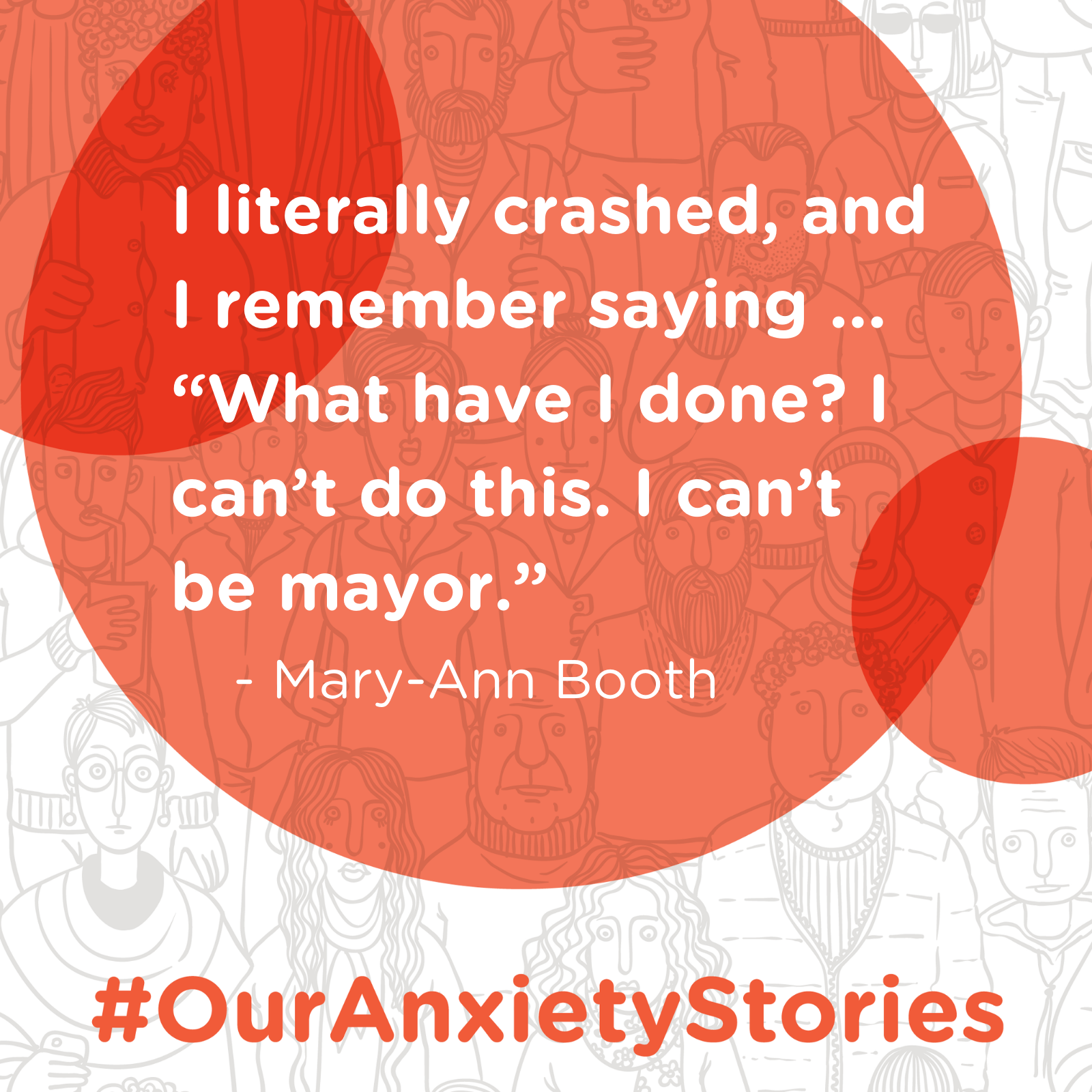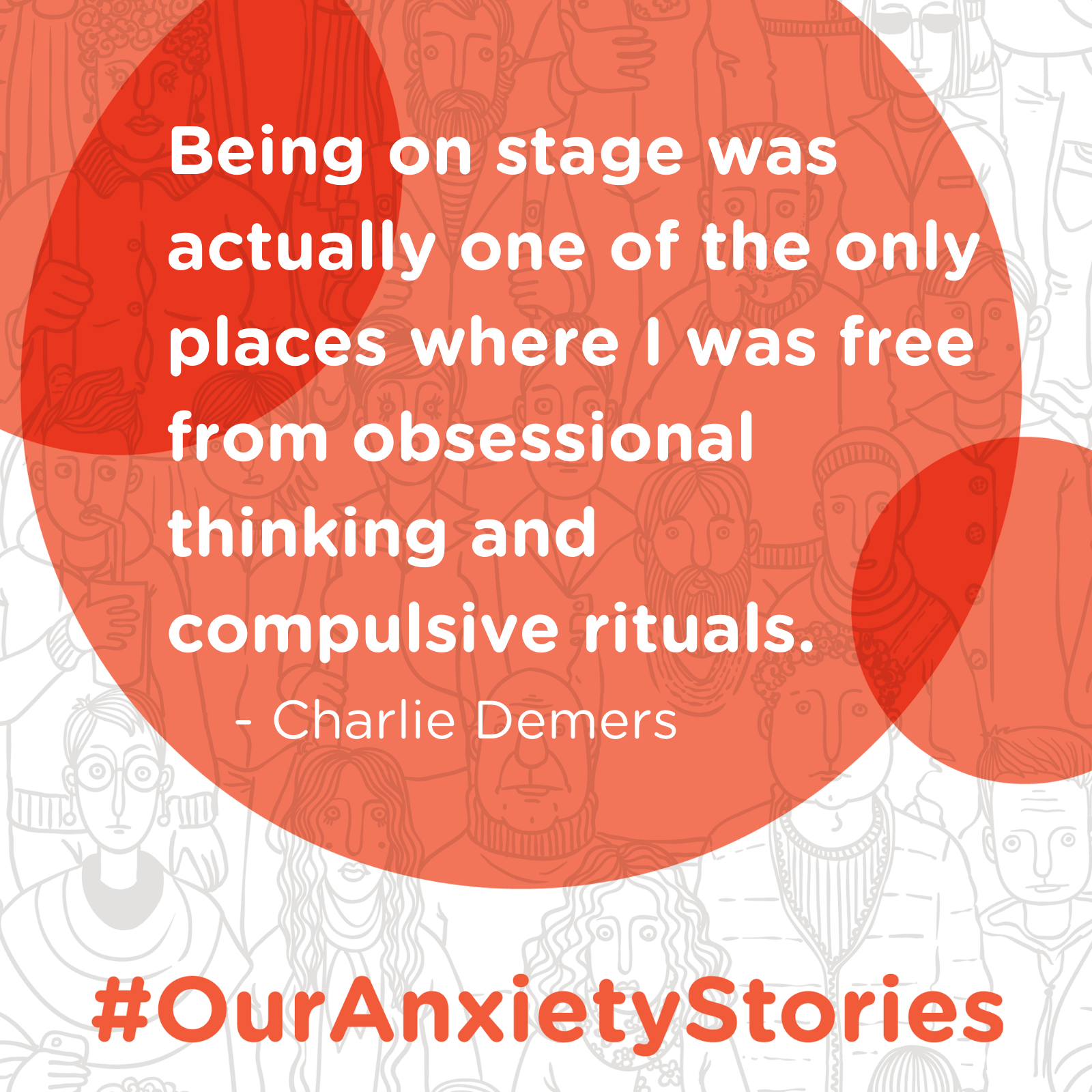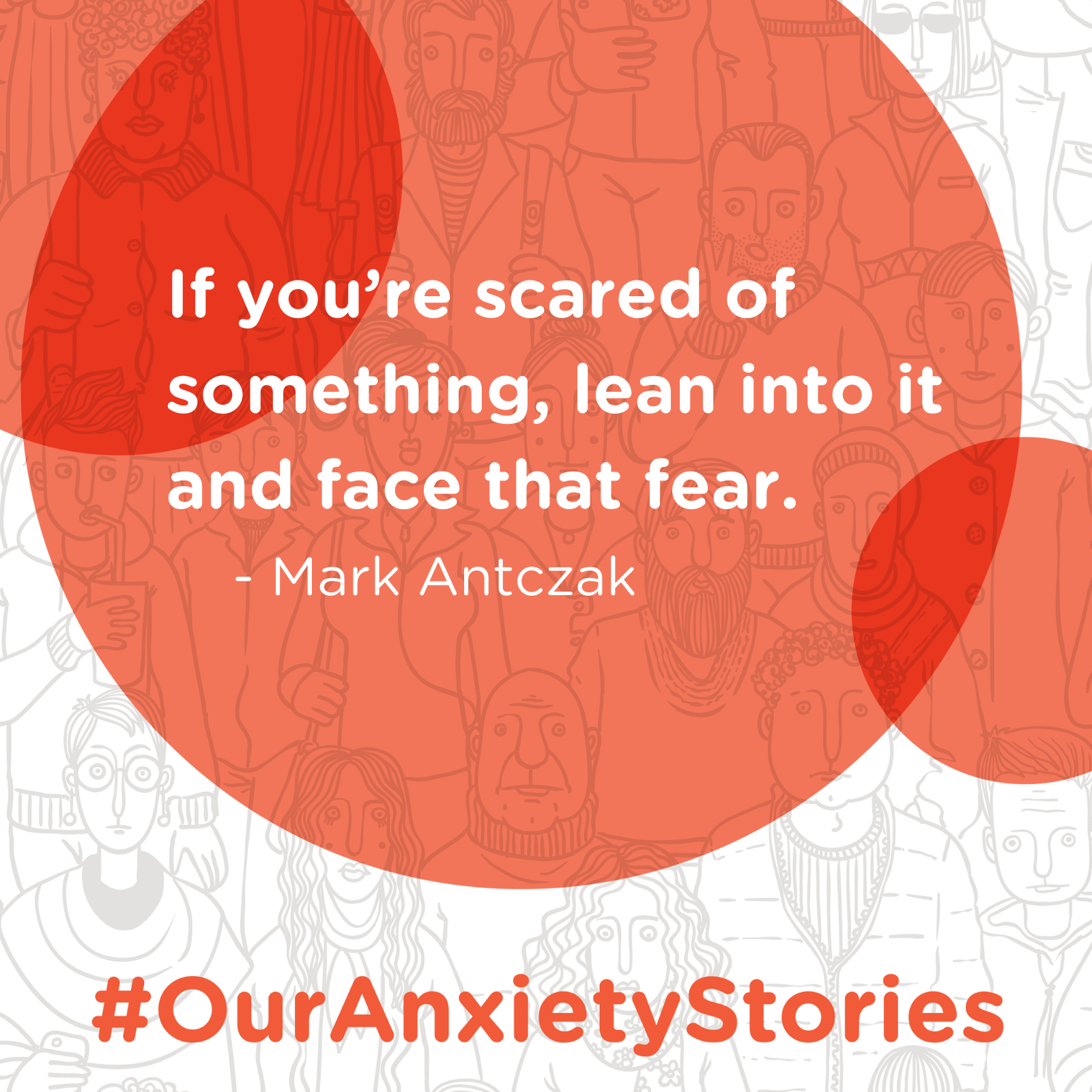Episode Transcript
Speaker 0 00:05 <inaudible>.
Speaker 1 00:08 You are listening to our anxiety stories, the anxiety Canada podcast with Jon Beekman. Check out anxiety canada.com for more totally free anxiety resources, including our app Mindshift at CBT.
Speaker 0 00:22 <inaudible>
Speaker 2 00:25 the off most interviews with the same basic question is to, for you to tell me your anxiety story, what's your anxiety, whether you experience it or you help people with it. Uh, what's your anxiety story?
Speaker 3 00:36 Um, both actually I started with anxiety at a very early age and um, I found out as an adult this few years ago that it was triggered by probably dental freezing.
Speaker 2 00:46 Dude, you're kidding me. These are the things that I'd love to learn.
Speaker 3 00:51 So I had dental work done that, um, it just, every time I went to the dentist it reinforced that. So I thought I had a fear of dentists, which eventually I found out the cause of it.
Speaker 2 01:02 Yeah.
Speaker 3 01:02 Um, and then there was other contributing factors as well throughout my childhood and my upper name, and I'm the child of a parent with anxiety. Right. So that just kind of, it just increased my likelihood of, of it sticking with me until I got help. I'm also a parent of a child with anxiety and so, so my son and I have, we talked about our anxiety and where we're finding our way around him support my mother now who unfortunately she's never gotten the help that could have helped her like cognitive behavior therapy or any medications. She always hurts me, which was really too bad because it was debilitating and as anxiety can be, it is by far the most easily treated mental illness.
Speaker 2 01:46 Yeah, for sure. I, that's such an interesting, uh, thing to hear that you, that you're <inaudible> with your mother. Um, did she, did you diagnose it? Did she, how was that diagnosed or how is that realize that she had it? I like, did you find that you had anxiety before you recognized it and her, how did that work?
Speaker 3 02:05 Yes, actually. Um, I found it out myself about what was impacting me and then we've heard it would be easy once we, um, once she let me in and I started going with her to the doctor. Um, she has other mental illness as well, but anxiety certainly was, um, it was very much impacted her reflecting back on, on life and seeing what she was like. Um, when I was a child, she very much became anxious atU prep periods of time in different situations. So she very, she has social anxiety, um, lots of phobias as well. Um, so, and my social anxiety was very much, um, prevalent and, and it became quite impactful on my life for a good number of years.
Speaker 2 02:53 Yeah, I imagine so because that would limit what she would do and what she would do with a family, I assume.
Speaker 3 02:59 Definitely. Yeah. For her interaction with others were very limited. She became isolated, which is a really big risk to people living with anxiety, um, is with social isolation. Yeah. It's still at, at 84 years old, she's still very hesitant to go out and to seek, um, conversations with people she not family with. So yeah, that's never left her. So she's really given me some, some insight and, um, things to think about how I want to live my life differently so that I'm not going to be impacted by anxiety and, and socialized isolation for the rest of my life.
Speaker 2 03:40 <inaudible> and, um, and so did you, did you ever, have you tried to get her help or she's just been resistant to it? How does that work?
Speaker 3 03:50 Unfortunately, now I'm calm compounded with other mental illnesses. My mother has dementia. Okay. Yeah. And so she's, she's fearful of, of everything, right? She lived in a very safe and protected environment where she's well cared for. Um, and she's not, she's never been open to talking about mental illness. Right. So, um, that was another piece that I felt was, um, extremely important and instrumental in being able to change my outcome. I had to be able to talk about it. And one of the things I do, um, with anxiety disorders association, amount of progress, if I'm sitting on the board of the directors, I also do public education. I appreciate the opportunity to go out and to speak with people about anxiety to, to normal life for conversation because it really hits the way the power when you start talking about it.
Speaker 2 04:42 Yeah. Does it ever, uh,
Speaker 3 04:45 yeah, it's <inaudible>
Speaker 2 04:46 do you, do you think, uh, I wanna I want to ask you one more question about your mom that I want to ask you about how it's, how your, you as a mother, how it's affected you, but, um, do you think that your mom just didn't have the, uh, sort of the, the general kind of gear to identify it as what it was and it was just the way she was from her generation? Do you think it's a generational thing, I guess is what I'm asking.
Speaker 3 05:11 Partially partially generational. They, um, there was some trauma, early trout, early childhood trauma in her life. Yeah. That also impacted, um, on her mental wellbeing. So anxiety goes along with her, her mental illness as well. Um, and she, she was always very resistant. Like don't talk about mental illness. Don't talk about being nervous. Yeah. None of those things put an out of your mind. It's all in his head and yeah, I guess it is all in our hat. Yeah. So learning how to think differently, um, certainly is, is a key point in learning how to manage anxiety.
Speaker 2 05:49 So with your experience with your, with your child, um, how did that, I guess right off the bat, you know, you're, you're somebody who's experienced anxiety. How'd that affect you when, when you start saw it coming?
Speaker 3 06:02 It wasn't until he was probably well grown adults, um, that she had, um, he realized he had anxiety and I don't think I'd recognize it now reflecting back on his childhood, I can absolutely see where it was in practice, but it's only been for myself. I'm actively seeking help. Over the last five or six years before that, I, I struggled on my own and it wasn't easy. Um, the moment I, I reached out for help, that was the first step is the most difficult in our minds. Yeah. But after that it's just baby steps all the way and, and it just gets better every day.
Speaker 2 06:43 <inaudible> and does your, does your daughter implement CBT, et cetera, et cetera for her, for helping her with her condition?
Speaker 3 06:51 Um, my son is sought out. Um, yeah, he's thought he sought out help. And um, I believe that the person that she, the therapist who saw w brought into his program, um, some CBT as well.
Speaker 2 07:09 Yeah. And you're the chair of the board of the anxiety disorders of Manitoba. Tell me about your work that you do with them.
Speaker 3 07:16 Well, I'm sure we're, um, we're certainly looking at updating our organization where a small, well, we were very small organization, grassroots started, you know, from the new paper adding in, um, the free class more than 30 years ago. And then with the help of some great psychologists, Dr. John Walker, who had been the head of the anxiety disorders clinic, let's move on to the hospitals. We have some outstanding programs and support available people throughout the province in Manitoba to help people with peer to peer support. Yeah. And so all of our staff and all of our volunteers have, um, have lived experience with anxiety. And when looking at making sure our aura organization is in a place to grow so that we can continue to expand to be outreach that we've got and to the touch more lives. Cause right. Last year we hit 30,000 people grew up with problems. Now it's over. That's how many people we were able to help. But that's, that's just a fraction probably of, of really the numbers that are out there that could be used to support.
Speaker 2 08:19 Yeah. Could you quickly go over this? Uh, you mentioned peer-to-peer, uh, could you go over what that, what that entails, how that works?
Speaker 3 08:26 So what we've anybody who comes into our program, so we've got y'all for public education. Um, we're just to give information to people with the, um, anxiety and they're supporting family members or friends. So it's someone who's thinking about their own experience as well as bringing in the programs that we offer, such as, um, we do our intake service. Someone goes in and speaks with her intake coordinator, who then helps to determine where that person is at and what to see the type of support, whether that person is ready for cognitive behavior program. The 10 week program that we offer, that's led, facilitated by people who have gone through our talking to behavior programming. They'll go through one-on-one peer support. We have a therapy dog, we have cookie, our cookie is the dog's name once a week. And therapy dogs are just amazing to reduce the anxiety of, we also have support groups for those people who maybe have gone through the programming and just want to have that back support along the way out. Or some people maybe have gone far enough down the journey that all they really need is just that this work environment to be able to help continue to manage their anxiety and unhealthy way.
Speaker 2 09:44 So are you, are you like w R then are you kind of an intermediary between, uh, say a patient and, and the health care system you, it sounds like you offer programming too.
Speaker 3 09:55 We do. We, Oh yeah. Our programs and support a great, we're, we're often people who are referred by, um, their, their medical practitioner. They will be referred to Adam for support and program. Yeah. So, and that's where I, again, we've, we've got a great relationship with the anxiety disorders clinic at the one as a cockatiel and like, and as well with other psychologists throughout the city and clinics. Um, community resources will refer people to Adam for support the program. Yeah. So that's where the board, as the chair of the board of directors, that's where our conversation has been going. I, we've, we've been working on our strategic plan for the next three years to see what we're going to look like in the future so that we can make sure that we're in a position to be able to appropriately support our communities.
Speaker 2 10:41 Yeah. It sounds like, you know, with the, the more exposure you get in, the more known you get, the more demand you're going to get placed upon you.
Speaker 3 10:48 Definitely. Yeah. We know it's there and the more we go out and talk about it and we go out and do public education, um, at all sorts of places, businesses, um, hospitals, wherever people feel that there's a need, that people are being impacted by anxiety and in a particular place for whatever reason, um, we're happy to go out and to do the public education to kind of take away from the misload anxiety and to give people some basic tools. Cause maybe that really, really needed just some basic information which on our website as well, we've got, um, online resources that are great in providing people some basic understanding about it. Maybe it's you tool that can help them and then guide them where to go with they need additional support in homes.
Speaker 2 11:34 Yeah. So what a, what is your webpage? Just, just your website URL.
Speaker 3 11:39 Adam. Dot. MD dot. CA.
Speaker 2 11:42 <inaudible> um, yeah, that's, that's, that's fabulous. And it sounds like you're doing fabulous work there in Manitoba, and I really appreciate you taking the time to talk to us and to be part this mental health day and be part of, you know, bringing, bringing sort of a exposure through everyday people to the rest of the world.
Speaker 3 12:01 Well, I, you know, I really appreciate the opportunity and with the amount of silver, we're really blessed to have so many good people and we've actually, we've got a group of, of people who come together to put on another gala, the second gala and Eve for Adam and that part of our <inaudible>. The goal is to raise additional funds to help, to support the expansion of our programs and to let us reach out further. Yeah.
Speaker 1 12:25 Okay. Fabulous. Thanks for talking with us. Take care. Bye.
Speaker 0 12:30 <inaudible>
Speaker 1 12:33 thanks for listening to our anxiety stories, the anxiety candidate podcast with Jon Bateman, checkout anxiety canada.com for more anxiety resources, including our app mind-shift CBT. And if you like what you hear, please consider making a donation. This podcast is made possible by listeners like you. Until next time
Speaker 0 12:52 <inaudible>.


